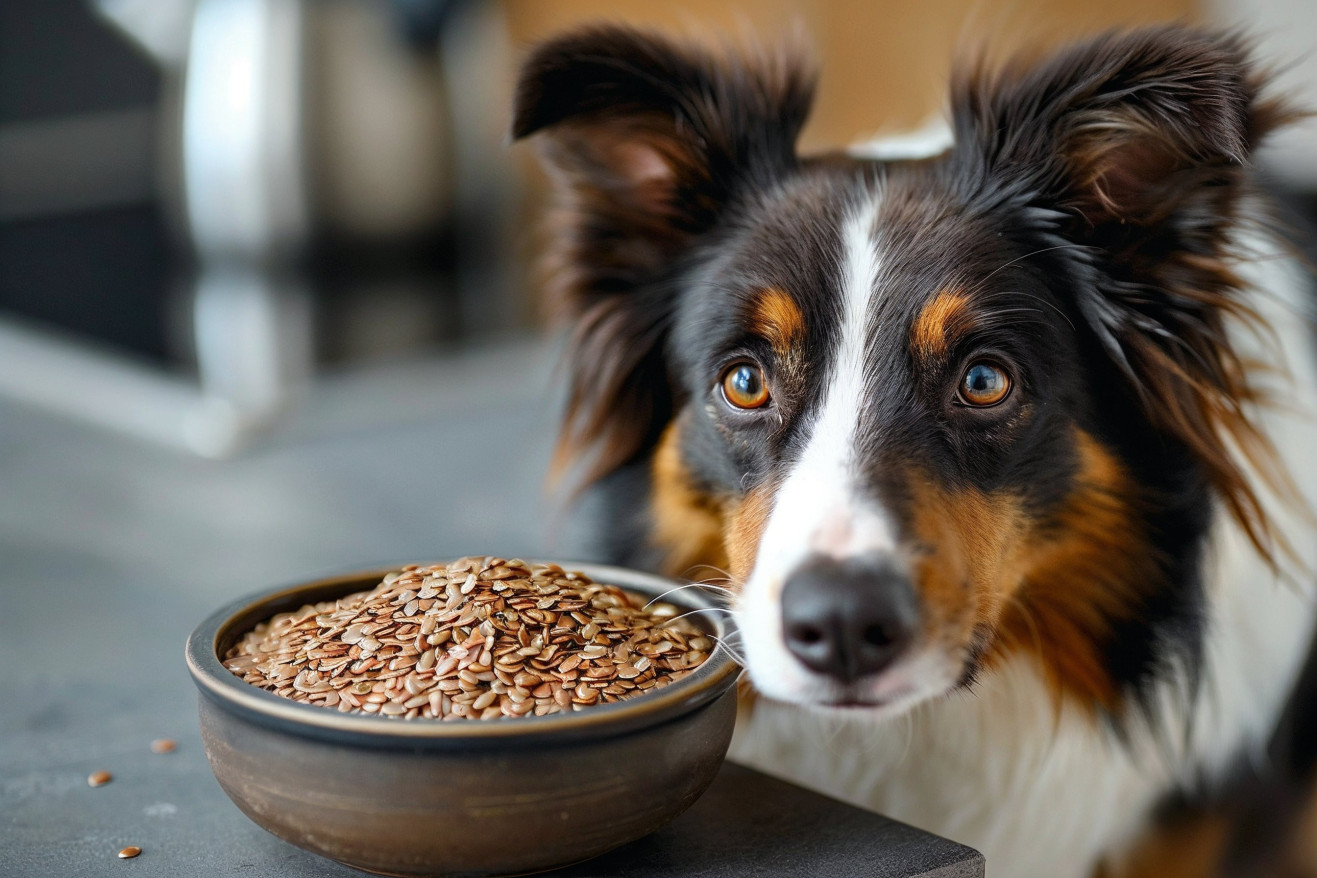Can Dogs Eat Flax Seeds? Benefits and Precautions
6 April 2024 • Updated 5 April 2024

Before you give your dog flax seeds, it's important to know what's in them, how much to give, and what to watch out for. Flax seeds can be a nutritious addition to your dog's diet in moderation, as they are a good source of fiber, omega-3 fatty acids, antioxidants, and other important nutrients. However, they need to be ground to make them easier for dogs to digest, and they need to be introduced gradually and fed in limited amounts because they are high in fat and can lead to digestive upset.
By reviewing the insights of veterinarians, pet nutrition experts, and research studies, you will learn about the potential benefits and drawbacks of feeding your dog flax seeds. You will also learn about the best serving sizes for different breeds and sizes of dogs, the safest ways to prepare flax seeds for dogs, and how to tell if your dog is having a bad reaction to this supplement-like food. Armed with this information, you can decide whether flax seeds may be a good choice for your dog's overall diet.
Can dogs eat flax seeds?
Flax Seeds Can Provide Nutritional Benefits for Dogs
Flax seeds are packed with nutrients that can offer a number of potential health advantages for dogs. They are a great source of omega-3 and omega-6 fatty acids, which can improve skin and coat health by hydrating and reducing inflammation. The anti-inflammatory effects of flaxseed can also help relieve arthritis and joint pain, which can lead to better mobility.
Flax seeds are also full of both soluble and insoluble fiber, which can help support good digestion by regulating bowel movements and preventing constipation or diarrhea. They also contain protein, antioxidants like lignans that can help support the immune system, and important vitamins and minerals like magnesium, choline, and phosphorus that can help with a variety of bodily processes.
Lignans in flax seeds may have other benefits as well, with some evidence showing that they can have anti-inflammatory and cardiovascular benefits. However, more research is needed to determine how much of an impact they have on dogs. That said, flax seeds are a valuable addition to your dog's diet and can be added in moderation to a well-balanced diet.
How to Feed and Prepare
As noted by Dogster, the recommended serving sizes for flax seeds can be based on the size and weight of the dog, and typically range from 1/2 teaspoon to 1 tablespoon a day. To make sure that the seeds are easily digestible and that the dog can absorb the nutrients, whole flax seeds should be ground or milled before they are given to dogs.
Flax seeds can be added to a dog's food or treats to make sure that they get the benefits. They can also be given as a supplement in the form of flax seed oil or flax seed meal. Your Old Dog recommends that you introduce flax seeds slowly and watch for any signs of digestive upset or allergic reactions, as overconsumption can cause loose stools or diarrhea.
Whole Flax Seeds vs. Flax Seed Meal: Which Is Best for Dogs?
Whole flax seeds have a tough outer shell that can make them hard for dogs to break down and absorb all of their nutrients, says Dogster. In contrast, ground or milled flax seed meal is easier to digest, which makes it easier for dogs to absorb the nutrients, including fiber, omega-3 fatty acids, and antioxidants.
Flax seed oil is a rich source of omega-3 fatty acids, but it doesn’t contain the fiber and other nutrients found in the seeds, according to The Wildest. For most dogs, ground flax seed meal is the best option for the most nutritional benefits and digestibility.
Whole flax seeds can sometimes pass through a dog’s digestive system whole, which means the dog’s body won’t be able to absorb all of the nutrients they contain, says Dogster. Ground flaxseed, on the other hand, is highly bioavailable and makes it easy for dogs to get all of the benefits of flax.
Potential Risks and Precautions
Although flax seeds can be a healthy addition to a dog's diet, there are some potential risks and precautions to keep in mind. WagWalking explains that overconsumption of flax seeds can cause digestive problems, including diarrhea and gastrointestinal upset. In addition, some dogs may be allergic to flax seeds and experience symptoms like skin rashes, vomiting, or difficulty breathing, according to HealthLabs.
Another concern is that raw or unprocessed flax seeds contain compounds that can cause cyanide poisoning if ingested in large quantities, says WagWalking. This is why it's important to make sure that flax seeds are processed before giving them to dogs.
Moreover, VCA Animal Hospitals notes that flax seeds can interact with some medications and make some health conditions worse. As a result, it's important to talk to a vet before giving flax seeds to a dog, especially if the dog has any health issues.
Conclusion: How to Integrate Flax Seeds Into a Healthy Diet
When given in moderation, flax seeds can be a healthy addition to a dog's diet. According to Healthy Paws Pet Insurance, flax seeds are a good source of omega-3 fatty acids, protein, manganese, and lignans, which can help with inflammation, joint health, and the immune system and skin. Meanwhile, MasterClass explains that the omega-3s, fiber, and antioxidants in flax seeds can help dogs in a number of ways.
That said, both articles warn that flax seeds should be given in small amounts because they can cause digestive issues, including diarrhea, if consumed in large quantities. It's important to introduce flax seeds to your dog's diet slowly and to talk to a vet before making any major changes. If you take the proper precautions and get the right guidance, flax seeds can be a helpful addition to a healthy diet for your dog.


